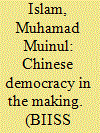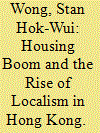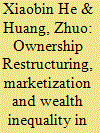| Srl | Item |
| 1 |
ID:
095947


|
|
|
| 2 |
ID:
162095


|
|
|
|
|
| Summary/Abstract |
Localist parties have become an emerging force in Hong Kong’s political landscape. What has caused the rise of localism in the city? Extant studies focus on cultural and social factors. In this article, we propose a political economy explanation: global and regional economic factors have caused a housing boom in Hong Kong since the mid-2000s and produced impactful redistributive consequences. While homeowners benefit tremendously from the hike in asset prices, non-homeowners stand to lose. Their divergent economic interests then translate into political preferences; homeowners support political parties that favour the status quo, while non-homeowners tend to support those that challenge it. Using a newly available public opinion survey, we find preliminary evidence in support of our argument. In particular, homeowners are less likely to identify with localist parties and tend to vote for pro-establishment ones. High-income earners, however, are more likely to vote for localist parties.
|
|
|
|
|
|
|
|
|
|
|
|
|
|
|
|
| 3 |
ID:
114791


|
|
|
|
|
| Publication |
2012.
|
| Summary/Abstract |
This paper proposes a property transformation perspective to examine the mechanisms of wealth accumulation and wealth inequality creation during China's post-1978 transformation. It examines how enterprise ownership restructuring, marketization and state politics have resulted in greater wealth inequality between cadres and ordinary workers, between public sectors/organizations and private sectors/organizations. Mainly drawing on data from the Chinese Household Income Project conducted in 1995 and 2002, we find that the property transformation process has created greater wealth disparity among different occupational groups and among those working in different work organizations since the mid-1990s. However, it is inconclusive whether non-housing wealth or total household wealth are increasing at the same pace across different occupations and work organizations with the growing market penetration and the spread of privatization.
|
|
|
|
|
|
|
|
|
|
|
|
|
|
|
|
| 4 |
ID:
182799


|
|
|
|
|
| Summary/Abstract |
Many scholars have evaluated the wealth creation effects of homeownership over different time periods and have agreed on the positive role of homeownership. However, there are no consistent mechanisms to measure the impact of homeownership on wealth inequality. Based on data from 1995 to 2018, this paper finds that the expansion of the homeownership rate in urban China was an equalizing force in the distribution of wealth from 1995 to 2008, driven by the increased homeownership and housing acquisition of low- and moderate-income households (LMIs) during the era of housing reform in the 1990s. The forces were exogenous and dominated by a redistributive logic. In the post-reform era after 2008, the decline in the homeownership rate led to a concentration of wealth distribution that was driven by the widening wealth gap between owners and non-owners, which represented an endogenous market force. The results indicate that there was an apparent discontinuity of the trends of homeownership and wealth inequality because new immigrants could not afford the price of housing in the cities. The wealth position of the middle and lower classes (mainly new immigrant non-owners) was crippled, not only by the inaccessibility of homeownership, but also by the reinforcing effect of the increase in housing prices. This study reveals the different mechanisms of homeownership on wealth inequality and the policy implications for the redistributive effects of the allocation of housing resources.
|
|
|
|
|
|
|
|
|
|
|
|
|
|
|
|